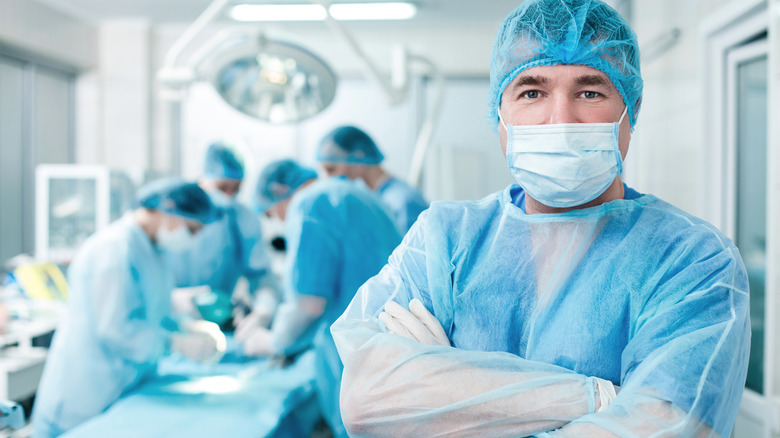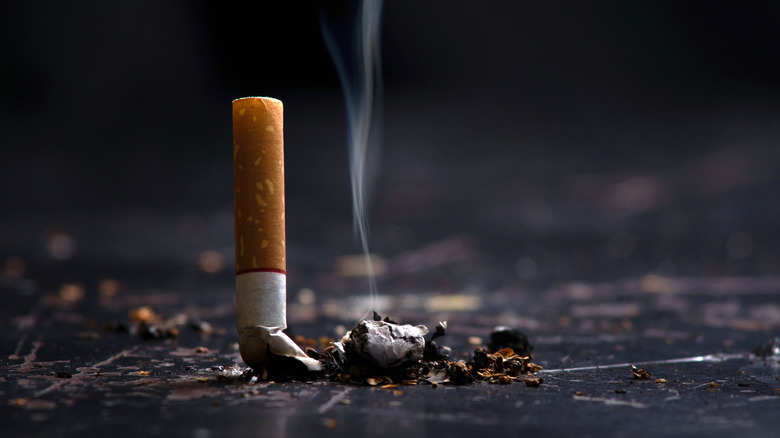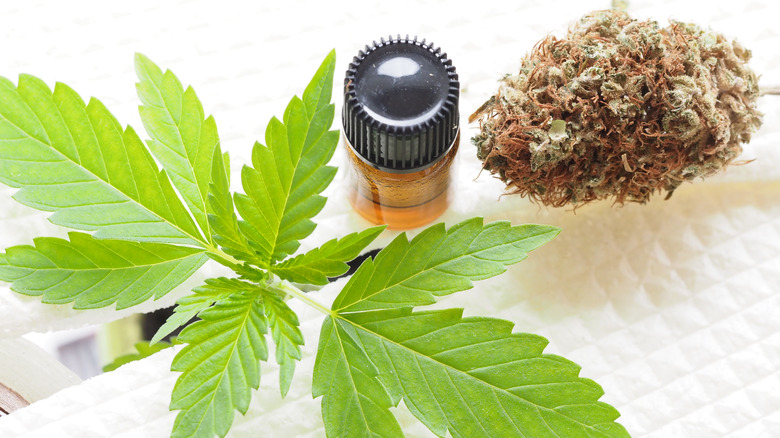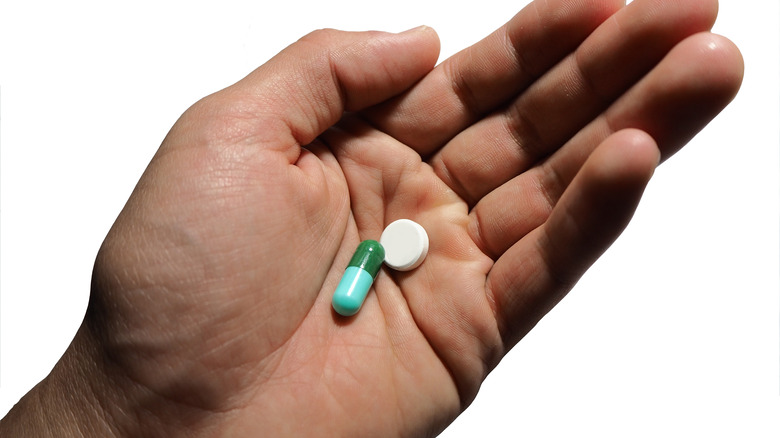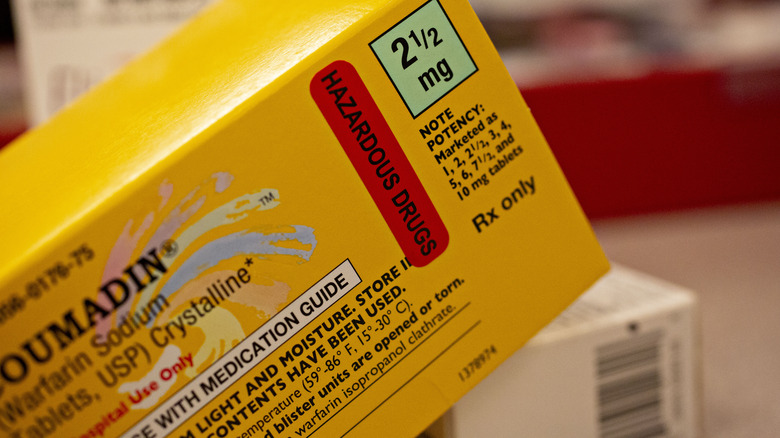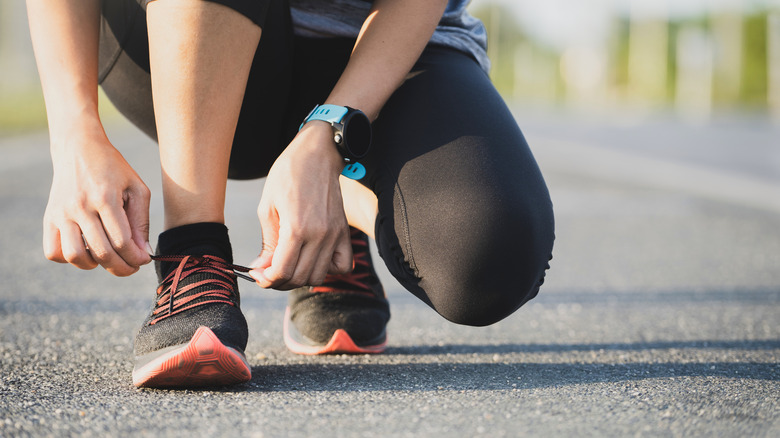Things You Should Never Do Before Having Surgery
The COVID-19 pandemic has turned the world sideways in so many ways that sometimes it almost feels we're right-sided once again. One thing many never saw coming — other than perhaps surgeons — was the disruption to the practice of elective surgery. This began with the first wave of the COVID-19 pandemic, according to an academic paper published in The Lancet on December 16, 2021. Initially, elective surgeries were canceled in order to redistribute operating room personnel to where they were most needed, which is to say, in the field with first responders. Many others weren't scheduled in the first place in light of scientific evidence suggesting post-operative COVID-19 cases were associated with increased mortality.
However, another paper, this one published in the Journal of the American Medical Association (JAMA) on December 8, 2021, suggests the number of elective surgeries being scheduled has been increasing. That is great news for many. In fact, there is reason to believe the return of elective surgeries to the calendar can save lives, according to The Wall Street Journal. With more people scheduling elective surgeries again, it seems a good time to address some of the things you should never do before having any kind of surgery, elective or otherwise.
Never drink alcohol the night before you're having surgery
The night before you've scheduled an elective surgery can be fraught with excitement or anxiety — in almost any other circumstance, a perfectly appropriate default would be to knock back a cocktail or two for a little attitudinal support. We say "default" because while it's a popular setting to relax a bit with alcohol before an anxious event, it's not optimal. In fact, it's a downright bad idea to drink any alcohol the night before you're scheduled to have surgery (via Healthline). You should abstain from drinking alcohol starting around 6 p.m. the night before your surgery is scheduled, according to Portneuf Medical Center.
One big reason is to make certain you are properly anesthetized at all times during surgery. The presence of alcohol in your system can change the way anesthesia affects you, which can make it difficult for your anesthesiologist to determine the dose you need to put you under safely (via the Anesthesia Experts). Another reason is that, since surgery is invasive, bleeding is inevitable. And because alcohol thins the blood, you could be at risk of bleeding complications during surgery, according to Moffitt Cancer Center. Better to wait until the appropriate time post surgery to enjoy your favorite alcoholic beverage.
Don't ignore your doctor's orders about food and drink before surgery
Traditionally, the rule among surgeons has always been that you should avoid eating or drinking anything in the 12 to 24 hours before surgery, and that includes water, ice chips, breath mints, and even chewing gum (via Verywell Health). The reason the rule exists is that food and drink in your belly has the potential of being aspirated — drawn up into your airway — while you are under anesthesia. Since most anesthesia dampens the natural impulse to cough, gag, or vomit as a way of clearing an aspiration, having food or drink in your belly increases the risk of "aspiration pneumonia" caused by aspiration, according to Jennifer Whitlock, a registered nurse.
In addition, having food or drink on board before surgery can also increase your risk of post-operative digestive issues, including nausea and vomiting. However, in recent years, the American Society of Anesthesiologists (ASA) has adopted new and more flexible practice guidelines regarding what you can and can't eat before surgery, with the upshot being that clear liquids can be consumed up until two hours prior to surgery, light meals up until six hours prior to surgery, and fatty or fried foods up until eight hours before surgery.
While the ASA has, indeed, adopted more flexible guidelines, surgeons will require some type of "fasting" protocol on a case-by-case basis. Patients should always follow a doctor's orders.
Avoid using tobacco after midnight the night before surgery
You shouldn't smoke cigarettes the night before surgery. "It's no secret that smoking causes serious health problems, including heart disease, asthma, and lung cancer," reports the American Society of Anesthesiologists. But anesthesiologists in particular have reason to be concerned that your exposure to smoke will put your heart and lungs at a disadvantage, one that no one can really afford when being given general or even twilight anesthesia (when a mild dose is given to ease anxiety). Smoking before surgery increases the risk of developing pneumonia and the potential of being put on a ventilator — which does the breathing for you — during or after surgery.
Smoking also interferes with blood flow, which is associated with slower healing. That means your surgical incision may take longer to heal and has more time to become infected. "It may be hard to believe, but quitting smoking even the day before your surgery can lower your risk of complications," the American Society of Anesthesiologists explains. "This is because your body starts to heal and your heart and lungs begin to work better as soon as you quit. The levels of nicotine and carbon monoxide — the unhealthy chemicals you inhale in cigarette smoke — begin dropping immediately, improving blood flow and reducing the likelihood of problems."
Don't smoke marijuana the night before surgery without having a chat with your surgeon
A decade or two ago, marijuana came up far less frequently in discussions between surgeons and their patients about what to do and what not to do before surgery. Now that consuming marijuana is legal in 18 U.S. states, whether or not to use marijuana before surgery has become something many doctors have to address. According to Harvard Health, marijuana use can make it more difficult to achieve sedation during anesthesia, requiring regular marijuana users an average of three times more propofol to do the trick. And that's a "huge increase," just in case it didn't already strike you as such.
Marijuana may have other affects on the body that can effect your care during and after surgery — this includes lowering blood pressure and raising your heart rate, more mucous, lung and airway issues, increased coughing, a higher degree of pain post surgery, and even a delay in awakening. Still, there is a lot that doctors don't know about how marijuana use can impact a surgical patient. What is known is that marijuana remains in the bloodstream for days, as opposed to hours with regard to alcohol. So if you don't smoke marijuana already, it's better not to start in the days and weeks before surgery. If you do, let your doctor know in advance, and discuss whether you should cut back before surgery.
These painkillers should not be taken before surgery
If you're feeling anxious about the prospect of post-surgical pain, you might be surprised to learn that acupuncture before surgery may be a viable non-medical option. In addition, many doctors will allow their surgical patients to take acetaminophen, which is sold under the brand name Tylenol, around the time of the last pre-surgical meal or snack. What many doctors prohibit before surgery is the taking of aspirin or any anti-inflammatory agent (such as ibuprofen, naproxen, or celecoxib aka Celebrex), or any substance containing any of the foregoing — because all of these have been associated with dizziness and an upset stomach, and potential bleeding issues (via University of Washington). Therefore, seek your doctor's approval, especially if you have kidney issues, stomach ulcers, or you're on blood-thinning medication, notes the Cleveland Clinic.
For the vast majority of people, that advice is fairly easy to swallow. However, some people take aspirin or non-steroidal anti-inflammatory (NSAID) painkillers on an everyday basis for health maintenance purposes, including to ward off blood clots, heart disease, and stroke, according to Harvard Health, which estimates as many as 15% of the population in the United States is doing so. For people who take these painkillers regularly, it may be worth discussing with your surgeon — at the time you schedule your surgery — how best to wean off aspirin and NSAID painkillers in the weeks before surgery. According to Washington University Physicians, stopping these drugs one week prior to surgery would be a reasonable approach in most cases.
Don't take the blood-thinner warfarin, aka Coumadin, before surgery
It isn't just over-the-counter medication such as aspirin and NSAIDs that can have an anti-clotting — or thinning — effect on the blood, which can be associated with excessive bleeding during surgery (via the University of Washington). Various prescription medications are also known to have an anti-clotting effect that counter-indicates their use prior to a scheduled surgery.
The most well-known prescription anti-blood-clotting drug is warfarin, also known as Coumadin, according to the University of Washington. People may be prescribed blood-thinning agents in connection with atrial fibrillation or other circulatory conditions, according to the Duke Clinical Research Institute. As important as these agents may be to supporting the health of such people, a clinical study out of Duke indicates that taking a brief and temporary break from these agents before elective surgery does not increase the risk of blood clotting in people who take blood thinners regularly — even when compared with people who had been given a shorter acting anti-clotting agent such as heparin prior to surgery.
Steer clear of these supplements before surgery
A number of herbs and herbal supplements available over the counter can increase the risk of complications if taken before surgery. This was news even to medical professionals back in 2001 — in a research paper published in the American Journal of Cosmetic Surgery, Dr. Melvin A. Shiffman, said, "It has recently come to the attention of the medical community, that herbs may be dangerous if taken just before surgery." Fast-forward more than 20 years, the fact that herbal supplementation before surgery can pose risks for the surgical patient, is much more widely known among medical professionals, per the University of Rochester Medical Center. Researchers point out that the following herbs are associated with these potential complications during surgery:
Echinacea has been associated with liver damage (if you have liver disease) if taken before having anesthesia. Ephedra has been associated with "high blood pressure and abnormal heart rhythms." Garlic in supplement form has been associated with increased bleeding during (and even after) surgery. So can ginkgo, feverfew, ginger (in supplement form), and saw palmetto. Ginseng, goldenseed, licorice (in supplement form), and milk thistle may cause changes in blood pressure. St. John's Wort can make recovery from the effects of anesthesia more difficult.
Don't abandon your healthy eating habits
Although it's understandable that you might start craving comfort foods whenever you start thinking about your upcoming surgery, the days and weeks immediately preceding your surgery — any surgery — is not the time to start giving in to temptation (notwithstanding the siren song of that platter of poutine) or otherwise abandoning whatever healthy eating habits you have already established. A healthy pre-surgical diet can help your body to repair itself after surgery, according to the Royal College of Anaesthetists.
Moreover, if you still have time — which is to say, if you're still a number of days, or even weeks, from the date of surgery — you might consider increasing your intake of protein-rich foods such as pork, chicken, beans, and low-fat dairy products, according to Jennifer Whitlock, registered nurse, (via Verywell Health). Just remember to also drink lots of water (up until eight to 12 hours before surgery) along with all that lean protein, because staying hydrated can help you feel less discomfort the night before surgery, when you're abstaining from food and drink.
Exercise remains important
You might think that if you're about to have hip or knee surgery — or if you're about to undergo surgery intended to reverse cardiovascular damage or mitigate cardiovascular illness — that you would be better off taking a break from your normal exercise routine in the days before surgery. However, the opposite is actually true. Specifically, in the case of those facing heart surgery, people who were in, and remained in, an exercise program before heart surgery tend to have more favorable outcomes, according to a 2013 research paper published in the British Journal of Anaesthesia.
In the case of orthopedic surgeries, including hip and knee replacement, the physical therapy specialists at Foothills Sports Medicine Physical Therapy not only recommend staying active before surgery, they have coined a phrase: "Prehabilitation Exercises," which refers to pre-surgical exercise routines meant to improve orthopedic surgical outcomes."Taking therapeutic action before surgery can help you recover faster, and strengthening the musculature around your hip and knee joint allows you to reap the benefits of rehab before the actual surgery," the specialists explained. In addition, prehabilitation exercises may even reduce the risk of blood clots. Of course, your own surgeon is in the best position to discuss with you the benefits of remaining active before surgery, not to mention whether this pre-exercise is applicable.
Don't have unprotected sex, especially if you're a woman and could get pregnant
Although some patients may not be thinking much about sex the night before a scheduled surgery, plenty are, per Surface Hippy, not to mention, this tongue-in-cheek letter from one Dr. James Petzold to the Canadian Journal of Rural Medicine. In fact, in most cases — and unless your doctor instructs you otherwise — it is absolutely fine to engage in sexual intercourse shortly before a surgery as long as you do so using contraception (if you're a woman of child-bearing age).
The reason is that unprotected sex can lead to pregnancy, and even if it's the very first day of your pregnancy, that pregnancy, including the health of the embryo, can be adversely affected by surgery, especially if that surgery involves general anesthesia, according to Dr. Judith Short, writing for the Royal College of Paediatrics and Child Health. Specifically, Short notes that "anaesthesia and surgery during pregnancy are associated with an increased risk of miscarriage, premature birth, low birth weight infants and infant death."
Don't skimp on sleep before surgery
The anesthesia you're given before surgery puts you into a "deep sleep so you do not feel pain during surgery," according to MedlinePlus Medical Encyclopedia. Nevertheless, you shouldn't skimp on sleep in the days before you have a surgery scheduled. "Although doctors often say that you'll be asleep during surgery, research has shown that going under anesthesia is nothing like sleep," according to the National Institutes of Health. In fact, if anything, the state of consciousness that is cultivated by general anesthesia is associated with post-surgical sleep disturbances, according to a 2010 study published in Frontiers in Neurology. This is one reason why it is important to get as good a night's sleep before surgery as possible, according to Johns Hopkins Medicine.
Another reason why it's important to prioritize sleep before a scheduled surgery is psychological. According to a 2013 study published in the Scandinavian Journal of Caring Sciences, sleep loss prior to surgery is associated with an increased risk of post-surgical emotional distress. A 2019 study published in the academic journal, Heliyon, concurred, noting that "sleep deprivation is considered a stress factor" with regard to the post-operative recovery period.
Ignoring your mental health before surgery, including feelings of anxiety, is not recommended
If you're preparing for surgery, even elective surgery that you spent years saving up for, there's going to be feelings to deal with, and not all of them may be positive. "Feelings of insecurity tend to surface before surgery and hospitalization," according to Shaare Zedek Medical Center, which maintains a web page dedicated to the important work of preparing — emotionally speaking — before surgery. It's not uncommon to feel a loss of control — of your body and your situation as you prepare for surgery. It's also not uncommon before surgery to feel afraid of complications, difficulty coping with the effects of anesthesia, post-operative pain, or general anxiety about the surgery's outcome. As the authors of a 2020 study published in the academic journal, Perioperative Medicine, pointed out, "A maladaptive response to surgical stress might lead to postoperative complications."
That's why it's important to not ignore your mental health before surgery. That may be as simple as figuring out what it is you need with you (in terms of personal belongings) at the hospital to feel like you have a measure of control over your surroundings, notes Shaare Zedek Medical Center. It might also involve securing childcare or help with household chores. Breathwork can be helpful as well, along with other exercises intended to induce a state of relaxation. And, of course, taking care of your mental health may call for recruiting the support of clergy, social workers, or just a caring friend or family member.

